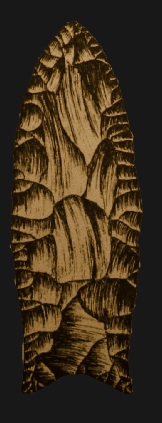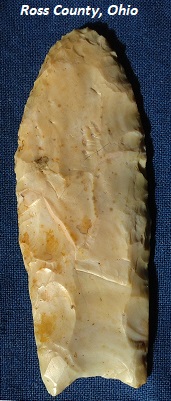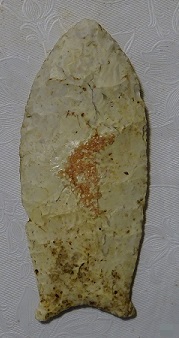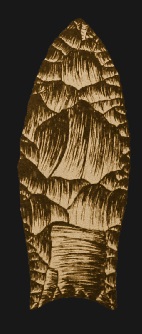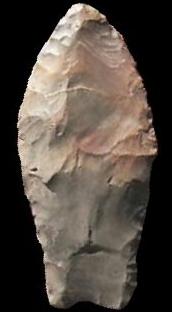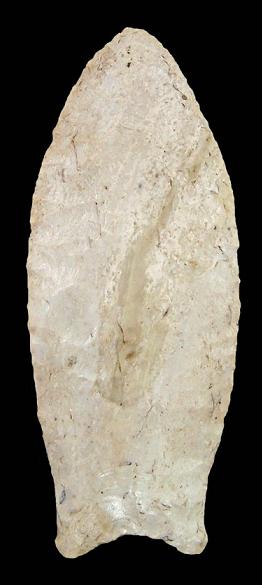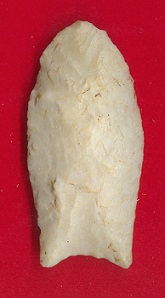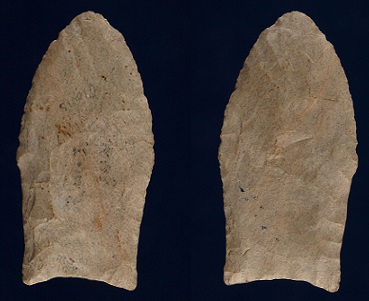Outline is Representative of Size and Shape:

Name Details:
Identified By: Arthur G. Smith
Named For: Ross County Ohio
Date Identified: 1965
Type Site:
Identified By: Arthur G. Smith
Named For: Ross County Ohio
Date Identified: 1965
Type Site:
Point Validity:
Valid type
Smith was an Executive Officer in the Ohio Archaeological Society. He published many professional publications. This is a sub-type for the Clovis type that has some professional recognition.
Smith was an Executive Officer in the Ohio Archaeological Society. He published many professional publications. This is a sub-type for the Clovis type that has some professional recognition.
Ross County Fluted
AKA: Hazel ClovisCluster: Clovis Cluster
Description of Physical Characteristics and Flaking Pattern:
This is a medium to large auriculated lanceolate point with a hexagonal cross section. The blade is recurvate constricting at the waist. The blade is generally longer and wider than other Clovis variations. The waist constrict at the waist and expands towards the base giving the point a ”fishtail” appearance. The base is concave. The center of each face has three to five large flat scars with finer pressure flaking along the edges. The flute rarely extends more than 1/3 the length of the face.
Size Measurements:
Total Length - 50 to 100 mm (average 75 to 85 mm), Blade Width - 20 to 40 mm, Waist Width - typically 5 to 10 mm narrower than blade, Base - Wider than waist and narrower than blade.
Total Length - 50 to 100 mm (average 75 to 85 mm), Blade Width - 20 to 40 mm, Waist Width - typically 5 to 10 mm narrower than blade, Base - Wider than waist and narrower than blade.
Commonly Utilized Material:
Additional Comments:
Some people consider a strong "fishtail" appearance as the Hazel variation.
This type is thought to represent the continuum of fluted waited points starting with the Clovis point, following through with points like this, and continuing into points like the Suwannee and Simpson types (Granger and Granger, 2013).
This is considered the same type as the Hazel sub-type named by G. E. Van Burten in 1974 in his book on Projectile Points.
There is great debate over the classification of Clovis style points. It is argued that the same characteristics of any single type can be seen through-out the distribution of the Clovis type and represent normal variations of the Clovis point. Others argue that specific areas specialized the type and are seen with greater frequency in those areas. Therefore, these represent later variants and unique subtypes to the Clovis point.
Some people consider a strong "fishtail" appearance as the Hazel variation.
This type is thought to represent the continuum of fluted waited points starting with the Clovis point, following through with points like this, and continuing into points like the Suwannee and Simpson types (Granger and Granger, 2013).
This is considered the same type as the Hazel sub-type named by G. E. Van Burten in 1974 in his book on Projectile Points.
There is great debate over the classification of Clovis style points. It is argued that the same characteristics of any single type can be seen through-out the distribution of the Clovis type and represent normal variations of the Clovis point. Others argue that specific areas specialized the type and are seen with greater frequency in those areas. Therefore, these represent later variants and unique subtypes to the Clovis point.
Distribution: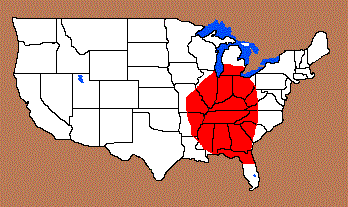
Distribution Comments:
This point is primarily found in the Ohio River valley, Tennessee River Basin, and the Great Lakes region.
This point is primarily found in the Ohio River valley, Tennessee River Basin, and the Great Lakes region.
Age / Periods:
Date: 14,000 - 10,000 B.P.
Cultural Period: Paleo
Glacial Period: Late Pleistocene
Culture:
Date: 14,000 - 10,000 B.P.
Cultural Period: Paleo
Glacial Period: Late Pleistocene
Culture:
Age Details:
Similar Points:
Alder, Barnes, Beaver Lake, Copena Articulated, Crowfield, Cumberland, Dalton, Golondrina, Folsom, Northumberland
Alder, Barnes, Beaver Lake, Copena Articulated, Crowfield, Cumberland, Dalton, Golondrina, Folsom, Northumberland
Other points in this cluster / Related / Associated Points:
Anzick, Clovis, Clovis St. Louis, Clovis St. Louis, Clovis Tulare, Clovis Un-fluted, Debert, Holcombe, Redstone
Anzick, Clovis, Clovis St. Louis, Clovis St. Louis, Clovis Tulare, Clovis Un-fluted, Debert, Holcombe, Redstone

